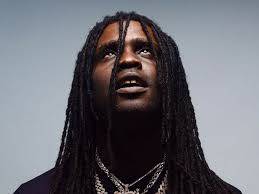Chief Keef, born Keith Farrelle Cozart on August 15, 1995, in Chicago, Illinois, is an American rapper, singer, songwriter, and record producer known for his pioneering role in the Chicago drill music scene. His distinct sound, characterized by heavy bass and aggressive beats, alongside his unique delivery and lyrical style, has influenced a new generation of hip-hop artists.
Early Life
Chief Keef was raised in the Englewood neighborhood of Chicago, an area known for its challenges, including high crime rates and gang violence. His upbringing was tumultuous; he was raised primarily by his grandmother after his mother was incarcerated when he was young. Keef’s exposure to street life had a significant impact on his music and artistic perspective.
Keef showed an interest in music at a young age. He began recording songs in his early teens, using a microphone he borrowed from a friend. He was influenced by various artists, including Lil Wayne, Gucci Mane, and Soulja Boy, but he quickly developed a style that was uniquely his own.
Rise to Fame
Chief Keef gained attention in 2011 with the release of his track “I Don’t Like,†which became a viral hit and garnered significant buzz in the hip-hop community. The song’s raw energy and catchy hook resonated with listeners, leading to a remix by rapper Kanye West. The remix helped to propel Keef into the mainstream, further establishing him as a key figure in the drill music movement.
In 2012, Keef released his debut album, Finally Rich, which featured hit singles like “I Don’t Like,†“Love Sosa,†and “3Hunna.†The album debuted at No. 29 on the Billboard 200 and received positive reviews for its authentic representation of Chicago’s street culture. The success of Finally Rich solidified Chief Keef’s status as a major player in the hip-hop scene.
Musical Style and Impact
Chief Keef’s musical style is characterized by its heavy use of 808 beats, minimalist production, and raw, unfiltered lyrics that often reflect his experiences with violence, street life, and his rise to fame. His sound is a defining feature of the drill genre, which originated in Chicago and is characterized by its dark, aggressive beats and lyrical content that often deals with themes of gang life and survival.
Keef’s influence extends beyond his own music; he has played a crucial role in popularizing the drill sound, inspiring a wave of artists both in Chicago and globally. His work has laid the groundwork for many contemporary artists, including Lil Durk, G Herbo, and Juice WRLD, who cite Keef as a significant influence on their music.
Personal Struggles and Challenges
Despite his success, Chief Keef has faced numerous challenges throughout his career. He has had multiple legal issues, including arrests related to gun possession and probation violations. His troubled personal life has often been in the spotlight, with reports of conflicts stemming from his lifestyle and the environment he was raised in.
In addition to legal troubles, Keef has faced criticism for his lyrical content and the perceived glorification of violence in his music. However, he remains unapologetic about his artistic expression, insisting that his music reflects his reality and the struggles he has faced.
Recent Years and Continued Evolution
In the years following Finally Rich, Chief Keef continued to release music and explore new artistic directions. He released several mixtapes and albums, including Bang 3 (2015), Two Zero One Seven (2017), and The GloFiles (Pt. 4) (2019). His music has continued to evolve, incorporating elements of trap and experimental sounds while retaining his distinctive style.
Keef’s influence on the hip-hop landscape has remained strong, as he has collaborated with various artists across genres, including Young Thug, Travis Scott, and A$AP Rocky. His ability to adapt to changing trends while staying true to his roots has helped him maintain relevance in an ever-evolving industry.
Business Ventures
Beyond music, Chief Keef has ventured into various business opportunities. He has launched his own record label, Glo Gang, which has allowed him to support and promote emerging artists. He has also engaged in merchandise sales, leveraging his popularity to create a brand around his image and music.
Legacy and Influence
Chief Keef’s legacy is marked by his significant impact on hip-hop, particularly within the drill genre. He is often credited with bringing the Chicago sound to a global audience and inspiring a new wave of artists who embrace authenticity and street narratives in their music. His willingness to be unapologetically himself has made him a symbol of the underground hip-hop movement and a voice for many who relate to his experiences.
Conclusion
Chief Keef’s journey from the streets of Chicago to becoming a significant figure in the music industry exemplifies his resilience and creativity. His unique sound, coupled with his ability to navigate the challenges of fame, has established him as a lasting influence in hip-hop. As he continues to release new music and expand his brand, Chief Keef remains a vital part of the conversation surrounding contemporary rap and its evolution.



No comments yet
Be the first to share your thoughts!